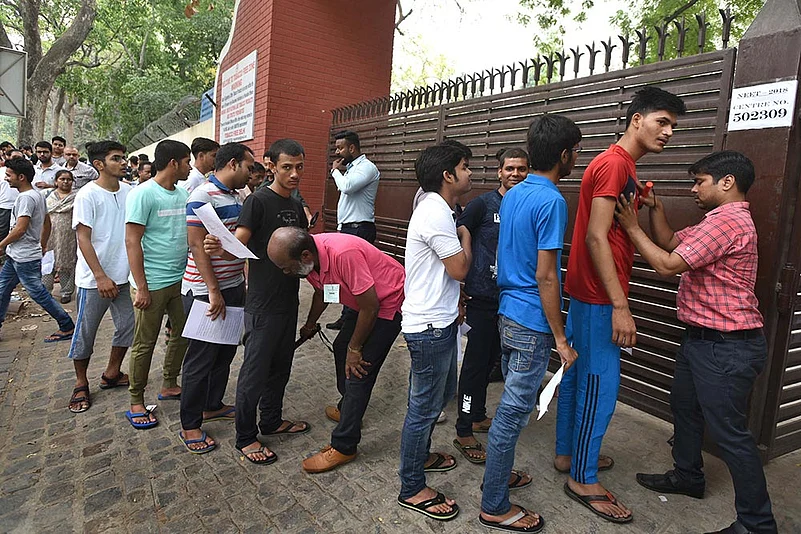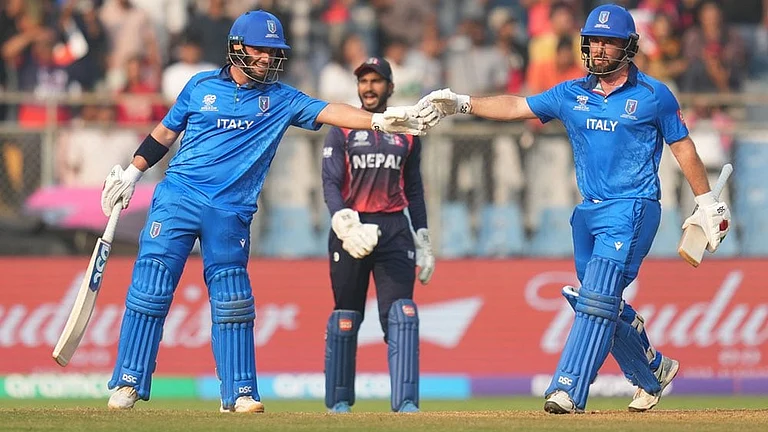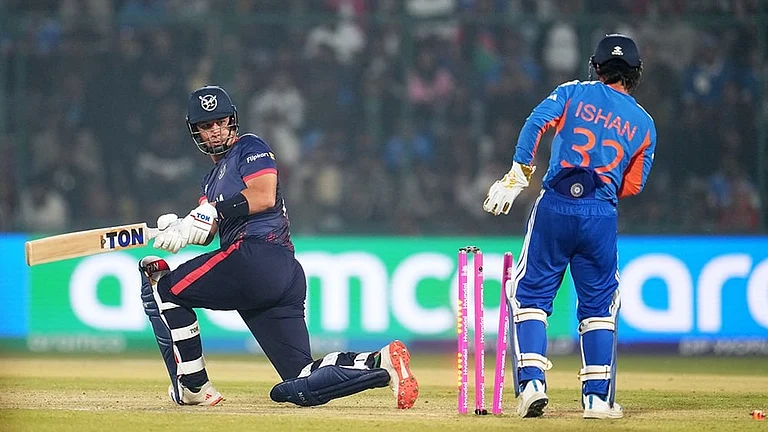It couldn’t have been a punchier slogan than this—One Nation, One Merit, One Examination. It couldn’t have been phrased better to promise wings to thousands of youngsters dreaming of a career in medicine, surgery or dentistry. The ones aching to take the Hippocratic oath after proving their merit and rigour. The “oneness” was also the sole argument for implementing the National Eligibility-cum-Entrance Test (NEET) in 2016 for admission to medical colleges in the country. Less than three years on, the exam appears to be in a muddle. Merit—as it happens always—has been relegated to the sidelines, while a ‘domicile’ criterion has become the overriding touchtone for the national test conceived to cut all things retrograde to India’s already dysfunctional medical education, starting with enrolment of students. Things have come to such a pass now that states are reserving seats for their ‘domicile’ candidates even in private colleges.
Several experts are of the view that the states are harkening back to the very ideas that are antithetical to NEET and trying to undo merit as the top criterion in selection of students for the MBBS and BDS courses in medical colleges within their jurisdiction. These states had opposed NEET when it replaced the All-India Pre-Medical Test (AIPMT), along with the pre-dental entrance test, to select candidates for 15 per cent seats in all government medical colleges across the country. The states held their own entrance tests to fill 85 per cent seats in government colleges and 100 per cent seats in private institutions. That gave the states a much bigger say in the fiercely competitive entrance tests to a handful of medical colleges—and also the power to manipulate.
The states’ control has not fully disappeared after NEET was introduced. The admission process for NEET-qualified candidates entails centralised counselling for which students have to apply online on websites under the respective state’s control. The counselling involves three to four phases. In each phase, candidates are allocated colleges on the basis of their marks/ranking. “The designated websites of states like Punjab, Maharashtra, Odisha, Madhya Pradesh and Rajasthan have domicile as a pre-condition. You need to fulfil this criterion before filling out the form for both government and private colleges,” says Arvind Jha, whose daughter cleared NEET this year. The Jhas are from Delhi and are unable to apply in other states.
Senior medical officials have confirmed this criterion. “Since no state allows candidates from other states, Maharashtra cannot be an exception. We cannot allow students from outside in the counselling process,” says Dr Tatyarao P. Lahane, director of the state’s directorate of medical education and research.
The Centre looks the other way. It says each state is free to decide its admission process as education is a state subject enshrined in the Constitution’s concurrent list. “Medical colleges are run by state governments. The domicile criterion for private colleges is also justified. It is entirely the wish of the state. If they want to allow students from other states, they can do so. If they don’t, it is entirely their discretion. The Centre has no role to play,” says Arun Singhal, additional secretary, Union health ministry.
States such as Uttar Pradesh and Karnataka have this admission rule for government colleges only. They allow candidates from other states to apply in private medical colleges. Yet, there are states that have reserved seats for domicile candidates (called the state quota) and some for outsiders (the management quota) in private colleges. Himachal Pradesh, which has only one private medical college, has reserved 25 per cent seats in the state quota and 75 per cent for other candidates. Similarly, West Bengal has reserved 33 per cent seats in the state quota and 67 per cent for management quota in private colleges.
This year, about 15 lakh candidates sat for NEET and eight lakh qualified. The successful candidates will compete for around 70,000 seats in government and private medical colleges across India. In a scenario where the candidate-seat ratio is abysmally skewed, the domicile criterion adds to the woes. Since some states don’t have colleges in proportion to its population, candidates from such regions are at a sheer disadvantage. In such states, a higher-ranked student might not secure admission. Dr S Sachidanand, a former director with the directorate of medical education, suggest that the Centre should call a meeting with the states to establish a uniform system.
A homogenous structure is needed as the domicile rule disregards merit/rankings of candidates ascertained through NEET, and its definition varies from state to state. If a NEET-ranked candidate’s parents own property in Punjab, the student can apply for admission in medical colleges there. Then again, in Maharashtra, the norms are different. Only students who have passed classes 10 and 12 from schools in Maharashtra can apply.
As far as reservation in government medical colleges is concerned, the Supreme Court has approved that in multiple cases. It has upheld that a state is at liberty to reserve 85 per cent seats for “domicile” candidates and 15 per cent for “all-India” students in government colleges. This reservation system is from the pre-NEET days and continues to date. “It is unfortunate that now states have started reserving seats for domicile category in private medical colleges. This practice never existed bef-ore NEET. It is being deliberately done to defeat the purpose of NEET,” says Amit Kumar, a Supreme Court lawyer.
Besides, states allowing “outsiders” to enroll in their private colleges are charging higher fees—at least three to four times higher than the state quota. Take the case of IQ City Medical College, a private institute in Durgapur, West Bengal. A candidate from the state quota has to pay a fee of Rs 2.23 lakh annually, whereas the same seat costs Rs 7.49 lakh for those from another state. Similarly, Maharishi Markandeshwar University in Himachal Pradesh charges Rs 8.47 lakh a year from a “domicile” and Rs 14.52 lakh from “outsiders”.
Education experts, doctors, lawyers argue that the states may reserve all seats in government colleges for domicile candidates, but private colleges should be open for all. They say this is not what they fought for, referring to the long-drawn litigation before NEET was allowed. The test was severely tested when more than 100 petitions were filed in high courts across the country against its introduction when the Medical Council of India (MCI) floated NEET in 2010. These suits were bunched and transferred to the Supreme Court. And after two years of hearing, a three-judge bench headed by then Chief Justice of India, Altamas Kabir, quashed the MCI regulation on NEET in July 2013. A companion judge, Justice Anil Ramesh Dave, gave a dissenting note. Then in 2016, a separate three-judge bench headed by Justice Dave recalled the NEET order as wrong and decided to review it. The court passed an order to implement NEET, based on which, exams were held for the first time.
The legal upheavals apart, NEET witnessed political turbulence as well. The southern states of Andhra Pradesh, Karnataka, Kerala and Tamil Nadu strongly objected its implementation. In fact, then Tamil Nadu chief minister Jayalalitha wrote to Prime Minister Narendra Modi, requesting him to withdraw the Union government’s review petition in the court. The argument was that NEET infringes upon the state’s right to determine admission policies for medical colleges.
***
- 15 lakh candidates appeared for NEET this year. Eight lakh of them qualify.
- 70,000 seats up for grabs in government and private medical colleges across India
- 85% seats in government colleges reserved for ‘domicle’ students and 15% for applicants from other states
- 33% seats for state quota and 67% for management quota in private medical colleges in West Bengal
- 25% seats for ‘state’ quota and 75% for ‘management’ quota in private medical colleges in Himachal Pradesh
- Rs 2.23 lakh annual fee in IQ City Medical College, Durgapur, for state quota student
- Rs 7.49 lakh annual fee in IQ City Medical College, Durgapur, for students who are not ‘domicile’ in West Bengal


























